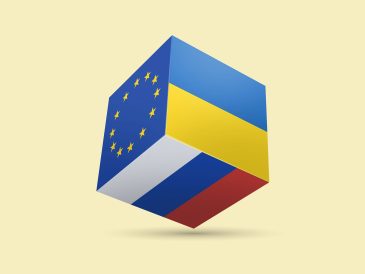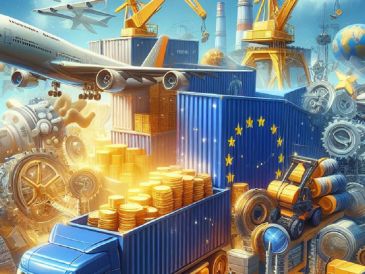Image: Hervé Azoulay
Hervé Azoulay, an engineer educated at the French Conservatoire National des Arts et Métiers, has held executive positions in prominent international companies such as INTEL and SCHNEIDER ELECTRIC. His extensive professional background includes delivering lectures at prestigious institutions like Sciences Po, HEC, IMSG Geneva, Renmin University, and Xi’an University in China. With numerous published books to his credit, Mr. Azoulay currently serves as the President of ATHES Finance and Participation and holds a professorial position at the Silk Road Business School (SRBS). In our conversation, Mr. Azoulay gave us his insights on some of the most intriguing aspects of global governance, themes from his book ‘Global Governance in Transition: Towards Multipolar Cooperation,’ and the future of global governance.

TEI: What prompted you to write your book? In your opinion, what is the most fascinating aspect of global governance?
Mr. Azoulay: What drove me to write this book on global governance is primarily to understand the complex political and economic systems that influence our planet, including power structures, interactions between nations, and global issues. I also aim to raise awareness about significant global problems, propose solutions, educate the public, and encourage actions to improve global governance for a better world.
As for the most fascinating aspect of global governance, it encompasses several things:
- The complexity and interconnectivity involving numerous entities and actors interacting on a global scale.
- The impact on people’s lives, communities, and nations, observing how decisions made at the global level can influence daily life.
- The diversity of global perspectives and cultures, involving a multitude of countries, cultures, languages, and different histories.
- The evolution and adaptation of global governance to address new challenges, technologies, and social changes.

TEI: It is fascinating to see how institutions such as the United Nations (UN), the International Monetary Fund (IMF), and the World Bank can be seen as both tools of domination and cooperation. What do you think are the reasons for this dual perception ?
Mr. Azoulay: The dual perception of international institutions like the United Nations (UN), the International Monetary Fund (IMF), and the World Bank as tools of both domination and cooperation stems from several complex factors related to their history, structure, and functions. Here are some of the reasons for this perception :
- Historical origin and founding context: These institutions were established in a post-World War II context, marked by a need for international cooperation to prevent conflicts and promote economic stability. However, their creation was also influenced by the major powers of the time, resulting in power imbalances and unequal representation.
- Structure and governance: The structure of these institutions, where certain members have disproportionate decision-making power (such as the permanent members of the UN Security Council), can be perceived as a tool of domination by those with less influence. Decisions made within these institutions often reflect the interests of the most powerful countries.
- Policies and conditionalities: The policies and conditions imposed by the IMF and the World Bank under structural adjustment programs can be seen as mechanisms of economic control and domination. These policies can sometimes favor the interests of donor countries or major economic powers at the expense of developing countries.
- Divergent goals and mandates : These institutions have varied mandates, and differences in their objectives can lead to different interpretations of their role. For example, the UN has a mandate focused on international peace and security, while the IMF and the World Bank have economic and financial mandates.
- Perception of results and effectiveness: The actual outcomes of these institutions, as well as their ability to address global issues such as poverty, conflicts, or financial crises, influence the perception of them. If these institutions fail to achieve their objectives, it can reinforce the perception of their ineffectiveness or bias.
Western World Democracy and the Human Rights
Mr. Azoulay believes that there are several threats to Western democracy, which vary from country to country. Additionally, there are various factors crucial for assessing global governance in safeguarding human rights. These factors encompass how international institutions and state actors address and implement human rights norms and principles.
TEI: In your exploration of the Western model of democracy, what do you believe is the most significant threat to this model in the constantly evolving geopolitical landscape?
Mr. Azoulay: In the constantly evolving geopolitical landscape, the Western model of democracy faces several significant threats. It’s important to note that these threats vary from country to country based on their specific contexts, but here are some general challenges the Western model of democracy is facing:
- Rise of authoritarianism and populism: In many regions of the world, we observe a rise of authoritarian leaders and populist movements that undermine democratic principles. These leaders question media independence, limit freedom of expression, and weaken democratic institutions.
- Disinformation and manipulation of public opinion: The increasing use of disinformation and online propaganda campaigns can influence public opinion and undermine confidence in democratic processes. Social media platforms can be exploited to spread false information and divide society.
- Socioeconomic inequalities: Growing inequalities, especially the widening gap between the rich and the poor, can undermine confidence in the democratic system by creating a sense of injustice and exclusion. This can lead to populist movements and widespread discontent.
- Cyberattacks and security threats: Cyberattacks targeting democratic institutions, elections, and information systems pose a serious threat. Foreign interference in elections and manipulation of results can undermine the legitimacy of democratic processes.
- Political polarization and social fragmentation: Increasing polarization and societal fragmentation into radically opposing groups can make it difficult to reach effective and consensus-based political decisions. This can weaken the stability and efficiency of the democratic system.
- Democratic backsliding: Some countries have experienced democratic backsliding, where democratic gains are reversed. This can manifest as the suppression of civil liberties, manipulated elections, and weakened institutions.
- Crisis of confidence in institutions: The loss of public confidence in democratic institutions, including governments, parliaments, and political parties, can compromise the legitimacy and effectiveness of the democratic model.
Global Governance in Transition, diverse languages (Image: Hervé Azoulay)
TEI: Given the current state of global governance, do you consider it to be a positive or negative force when it comes to safeguarding human rights? How so?
Mr. Azoulay: Assessing global governance as a positive or negative force for safeguarding human rights depends on several factors, including how international institutions and state actors address and implement human rights norms and principles. Here’s an analysis considering both perspectives :
Global governance as a positive force for human rights:
- Establishment of international standards: Global governance has contributed to the establishment of international human rights standards, such as the Universal Declaration of Human Rights, international covenants, and specific conventions. These standards provide a crucial framework for the protection and promotion of human rights on a global scale.
- Monitoring and accountability: International mechanisms for monitoring human rights, such as reports and periodic reviews, help identify gaps and potential human rights violations in member states. This can contribute to accountability and incentivize improvements.
- Advocacy and awareness: International organizations, such as the UN and its specialized agencies, as well as international non-governmental organizations, play a crucial role in advocating for and raising awareness about human rights issues. They mobilize public opinion and exert pressure for positive reforms.
Global governance as a negative force for human rights:
- Power imbalances: Power and influence imbalances among member states of international institutions can lead to biases and discriminations in decisions and actions related to human rights. Some influential countries may carry more weight in negotiations and decisions, affecting the fairness and universality of human rights.
- Lack of effectiveness and enforcement: International bodies can sometimes lack efficiency in implementing human rights standards and recommendations. Obstacles such as bureaucracy, slow processes, and non-compliance with decisions limit concrete impact on upholding human rights.
- Political and geopolitical interference: Political conflicts and geopolitical rivalries can influence decisions related to human rights and create barriers to collective action. Some countries may be less inclined to act in favor of human rights in regions where their political interests are at stake.
China and BRICS
Several elements and conditions need to be considered, says Mr. Azoulay about the potential success of the Chinese model as an alternative to Western globalization. BRICS poses a significant challenge to the established world order, mainly due to their economic weight, growing political influence, and willingness to question certain international norms and institutions…

TEI: How can the Chinese model succeed as an alternative to Western globalization?
Mr. Azoulay: The Chinese model is often presented as an alternative to Western globalization. For it to succeed as an alternative, several elements and conditions need to be considered:
- Sustained economic growth and sustainable development: The Chinese model must continue to generate robust and sustainable economic growth. Emphasis on investment in infrastructure, technology, education, and innovation plays a crucial role. It is also essential to adopt sustainable economic practices to minimize environmental impacts.
- Political stability and leadership coherence: Political stability is a key element for the success of the Chinese model. Consistent leadership and a long-term vision are necessary to maintain political stability and policy effectiveness at both the national and international levels.
- Constructive participation in international institutions: China must actively engage with international institutions, share its experiences, and contribute constructively to global governance. This can help build trust and demonstrate that the Chinese model can be compatible with effective international cooperation.
- Collaboration and international partnerships: China must foster cooperation and partnerships with other nations. By developing positive relationships, facilitating fair trade, and investing in international projects, China can showcase the value of its model as a global contributor.
- Technological and digital innovation: Massive investment in research, development, and adoption of advanced technologies is crucial. China should continue to take a leadership role in areas such as artificial intelligence, 5G, blockchain, and renewable energy.
- Promotion of cultural diversity and dialogue: Valuing cultural diversity, promoting intercultural dialogue, and respecting cultural differences are key elements to gain global acceptance.
- Environmental responsibility: China must continue to strengthen its commitment to environmental responsibility. Policies aimed at reducing pollution, promoting renewable energy, and achieving ambitious environmental goals are essential.
TEI: When discussing global changes, the BRICS group (Brazil, Russia, India, China, South Africa) is frequently mentioned. In your opinion, to what extent do the BRICS pose a major challenge to the established world order?
The BRICS (Brazil, Russia, India, China, South Africa, Saudi Arabia, United Arab Emirates…) pose a significant challenge to the established world order, mainly due to their economic weight, growing political influence, and willingness to question certain international norms and institutions. Here are some reasons why the BRICS can be seen as a major challenge to the existing world order:
- Rising economic power: The BRICS, as a group, represent a substantial portion of the global economy. China and India, in particular, have booming economies and play a major role in international trade, investment, and technological development.
- Demographic weight and significant domestic market: The BRICS countries are home to a significant portion of the world’s population, making them significant domestic markets. Their demographic dynamism and rapid urbanization contribute to their growing economic influence.
- Challenging the international financial system: The BRICS have expressed concerns about the current structure of the international financial system, including the role of the U.S. dollar as a reserve currency. They have sought to promote alternative financial mechanisms and increase their influence in international financial organizations.
- Collective voice in international forums: The BRICS seek to consolidate their political influence by unifying their positions on key international issues. They cooperate in forums such as the United Nations, the G20.
- Geopolitical and security partnerships: The BRICS collaborate in geopolitical and security domains, potentially challenging existing alliances and balances. They seek to promote a multipolar approach and greater independence in their strategic decisions.
- Enhanced economic and trade cooperation: The BRICS have developed mechanisms for economic cooperation, such as the New Development Bank (NDB), aimed at financing infrastructure projects in member countries. They also promote intra-BRICS trade to reduce dependence on Western economies.
- Regional and global influence: The BRICS exert increasing influence in their respective regions and beyond. China and Russia are particularly active in promoting their geopolitical and economic interests globally.
However, it’s important to note that the BRICS do not form a homogeneous bloc and have diverse interests and priorities. The degree of challenge they pose to the established world order may vary based on these differences and the evolving nature of their relationships with other international actors.
The Future of Global Governance
TEI: As we conclude our discussion, in your expert opinion, what do you believe is the greatest challenge the world will face in the realm of global governance in the foreseeable future?
In the foreseeable future, one of the greatest challenges the world will face in the realm of global governance is likely the ability to address interconnected global challenges, including the climate crisis, increasing inequalities, regional conflicts, pandemics, cybersecurity, and artificial intelligence, in a coordinated, effective, and equitable manner. Here are some key aspects related to this challenge:
- Climate crisis and sustainability: The climate crisis demands collective action, and global governance must coordinate efforts, promote renewable energy, and encourage sustainable practices on an international scale.
- Inequalities and social exclusion: Managing the growing inequalities among nations and within them is crucial to avoid social and economic tensions. Global governance should aim to promote inclusive policies, redistribute benefits, and improve access to education, health, and employment.
- Pandemics and global health: Health threats, such as pandemics, require enhanced international coordination in terms of surveillance, prevention, and rapid response. Global governance must enable mechanisms for rapid sharing of information and resources to address such health crises.
- Digital security and cyber threats: With increasing digitization, global governance must develop standards and regulations to ensure digital security, protect privacy, and prevent cyber-attacks. International cooperation is essential to address these cross-border threats.
- Artificial intelligence and ethics: The rise of artificial intelligence raises complex ethical and socio-economic questions. Global governance must develop regulatory frameworks and standards to guide the responsible and beneficial development and use of AI for humanity.
- Wars and conflicts: Conflicts and geopolitical threats persist in various regions of the world. Global governance must promote diplomacy and mediation to resolve conflicts peacefully and foster regional and global stability.
- Responses to migration and massive displacements: Forced population displacements due to conflicts, natural disasters, and other factors are a major challenge. Global governance must develop policies and mechanisms to manage these movements in a humane and orderly manner.
To address these challenges, strengthened international cooperation and coordination are essential. This requires nations to set aside their differences and collaborate constructively, placing collective interest above individual interests. It is also crucial to include a diversity of perspectives in decision-making processes to ensure proposed solutions are fair and sustainable. The way forward involves embracing the diversity of political systems, seeking innovative and balanced solutions, and promoting mutual understanding. As individuals, nations, and global citizens, we have the power and responsibility to contribute to a more just, equitable, and sustainable global governance. As Saint Augustin said: ‘The world is a book, and those who do not travel read only one page.’
Editor’s Note: The views and opinions expressed in this interview are solely those of the interviewee and do not necessarily reflect the official stance of the interviewer or The European Intelligencer. Our platform values diverse perspectives and encourages open dialogue on various topics. Any discrepancies with our editorial position are unintentional, and we remain committed to presenting a balanced and inclusive range of viewpoints.










